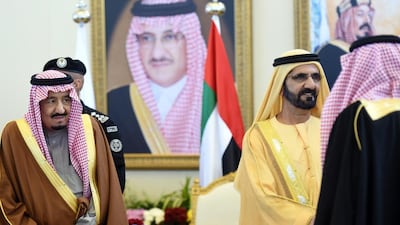Saudi Arabia’s king said on Wednesday that all countries have a responsibility to combat terrorism and extremism, as the 36th Gulf Cooperation Council summit opened in Riyadh.
“Islam rejects and abhors terrorism, because it is a religion of moderation and tolerance,” said King Salman bin Abdulaziz Al Saud in his opening address at Diriyah Palace.
Qatar’s Emir Sheikh Tamim bin Hamad Al Thani told the summit that recent attacks in several countries prove this “odious scourge” is a threat to everybody.
“The international community must, more than ever, intensify efforts to combat terrorism in all its forms and eliminate its real causes by all means,” he said.
The UAE delegation to the two-day meeting was headed by His Highness Sheikh Mohammed bin Rashid Al Maktoum, Vice-President and Prime Minister of the UAE and Ruler of Dubai, according to state news agency Wam.
For the past year, Qatar has held the six-state GCC’s rotating presidency. Saudi Arabia assumes the presidency for 2016.
King Salman thanked Emir Sheikh Tamim for his “successful efforts”.
“The region is [facing] very complicated conditions, challenges and ambitions which require us to stand and work together to continue to fortify our countries against foreign threats and extend a helping hand to our brothers in order to restore security and stability in addition to addressing challenges facing our Arab region and resolving their issues,” he added.
The GCC was founded in 1981 and includes the UAE, Saudi Arabia, Qatar, Bahrain, Oman and Kuwait.
“This session is held while the region is witnessing serious challenges that require vigilance and hard work in order to preserve GCC achievements and to seek further integration and solidarity to achieve the hopes and aspirations of the GCC citizens,” GCC Secretary General Dr Abdullatif bin Rashid Al Zayani said, according to the official Saudi Press Agency.
Talks also focused on the wars in Yemen and Syria and the threat posed by Iranian meddling.
A Saudi Arabia-led coalition of mostly Arab countries, backed by the United States, intervened in Yemen last March in support of the internationally recognised government. President Abdrabu Mansur Hadi had been driven from the capital Sanaa by Iranian-backed Houthi rebels allied with former president Ali Abdullah Saleh, the country’s long-time leader who was overthrown in Arab Spring unrest in 2011.
The rebels were expelled from key areas including the southern port of Aden and the energy producing governorate of Marib, but the offensive slowed as government loyalists and allied troops drew closer to Sanaa.
It appeared all sides wanted to avoid the kind of bloody street-to-street, house-to-house fighting that taking the ground war into the capital would likely involve.
Mr Hadi has now said that his government will engage in peace talks with the rebels. Negotiations are expected to begin in Geneva and a week-long truce will begin on December 15.
“Regarding Yemen, the coalition countries are keen to achieve security and stability in Yemen under the leadership of its legitimate government. We, the GCC states, support a peaceful solution in order to enable Yemen overcoming the crisis and restoring its march towards construction and development,” said King Salman on Wednesday.
Meeting in Riyadh at the same time, a group of more than 100 Syrian rebels and members of the political opposition were aiming to establish a strategy for negotiating with the Assad regime before the new year.
Saudi Arabia is among the key backers of the Syrian opposition, but a recent push to end the war in the country has seen the involvement of several GCC countries. The UAE took part in Vienna talks this autumn between the key backers of the opposition and the regime. The diplomatic activity even saw Oman’s foreign minister Yusuf bin Alawi meet Syrian president Bashar Al Assad in Damascus in October.
The regional unrest in Syria and Yemen was set against the backdrop of falling oil prices. Earlier this month, the Organization of Petroleum Exporting Countries (Opec) decided against cutting oil production, meaning that a global oversupply of oil continues to send prices downwards, pushing GCC countries to look towards economic reforms.
While Oman – which is not a member of Opec and prefers to play a mediator role in the Yemen conflict rather than join the Saudi-led military coalition – remains an outlier, the meeting came at a time of GCC unity not seen in years. Previously, Qatar, in particular, had been at odds with the other states over its support for the Muslim Brotherhood.
“I think the Saudis feel that given the grave – perhaps existential – threats the GCC countries face from the turmoil around them as well as the formidable economic challenges in light of the drop in oil prices, it is necessary to bring more cohesion,” said Fahad Nazer, a former political analyst the Saudi embassy in Washington.
“The thinking appears to be predicated on the premise that acting collectively is more efficacious than each member acting unilaterally.”
jvela@thenational.ae
* With additional reporting by agencies

